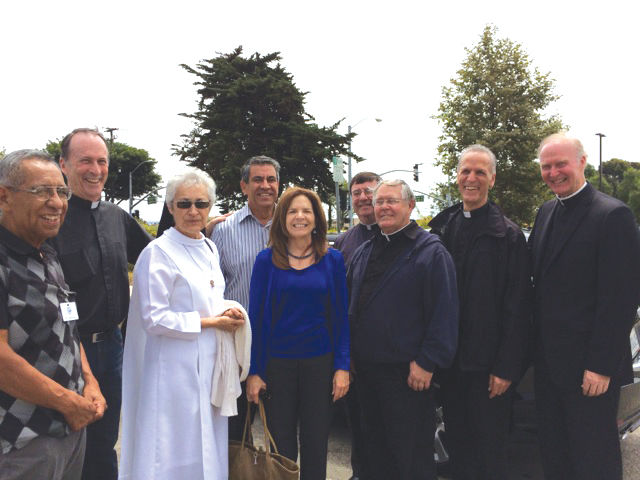It was just after lunchtime at the temporary housing shelter at the Port Hueneme Naval Base, and the Central American migrant teenagers coming inside from their tented dining room on the way to afternoon activities smiled and waved as they passed by the archdiocesan visitors.
The nine-member delegation visiting the shelter housing unaccompanied children apprehended by U.S. Border Patrol authorities — among tens of thousands of Central American children detained this year at the border — made the trip on Aug. 6, a few days before the last remaining 24 children would depart to stay with sponsors, primarily parents and relatives, while they await immigration court hearings. Officials estimate that 800 of the unaccompanied minors have been placed for the time being in the Los Angeles area.
Since the naval base shelter at Port Hueneme opened on June 6, a total of 1,350 children from El Salvador, Guatemala and Honduras have stayed an average of 20 days at the facility. It’s scheduled to close within a few weeks, along with two other interim shelters on U.S. military bases in Texas and Oklahoma, due to decreasing numbers of minors making the trip.
“I did not expect to find a facility that was so well-oriented to the needs of the detainees there,” said Dominican Sister Cecilia Canales, archdiocesan vicar for women religious, who made the Aug. 6 trip to the naval base shelter in Ventura County along with clergy and representatives from the archdiocese’s Office of Life, Justice and Peace. She noted the “all-inclusive” and “well-organized” social services, including education and recreational activities, provided at the shelter overseen by U.S. Department of Health and Human Services (HHS) officials.
“I was very impressed with what they tried to provide there — the real question is what happens to [the children] now,” said Sister Canales. She was happy to hear that staff members escorted the children to their sponsors, who had been checked out in advance by officials to make sure that the minors weren’t being put into any kind of a human trafficking situation or any other environment where they would be at risk.
“One of the biggest challenges [for these children] is going to be the legal representation — how to find enough pro bono lawyers to take their cases, because they could be in the system for two years,” said Sister Canales.
Msgr. Michael Jennett, Santa Barbara Region Episcopal Vicar who was among archdiocesan clergy on the tour, told The Tidings that the care given to the children at the interim shelter looked like it was being handled very well in a caring and professional manner.
“My main concern had been their pastoral care,” said Msgr. Jennett, who noted that a local Catholic hospital chaplain made a visit within two weeks of the shelter’s opening. Through perseverance, he said, permission was received for Augustinian Recollect Father Fidel Hernandez to come from Mary Star of the Sea in Oxnard (the closest parish) to celebrate Sunday Mass on July 27 and Aug. 3.
“The children appreciated very much the pastoral care and the opportunity to go to Mass and partake of the sacraments,” said Msgr. Jennett.
He recounted a story told to the visitors that “to the surprise of many of the staff, quite a few children chose to go to Mass rather than catch the [Sunday] game” on television.
“I’m very proud of Father Fidel and the Augustinian Recollects for taking on this extra ministry without any hesitation,” said Msgr. Paul Albee, pastor of Holy Cross in Moorpark who was also part of the visiting delegation. He added he wasn’t surprised to hear that Father Fidel was present in a sequestered area hearing confessions the day of the tour.
Fellow tour participant Father Paul Griesgraber, pastor of twin parishes St. Catherine of Siena (Reseda) and St. Bridget of Sweden (Van Nuys) and a member of the pastors’ immigration committee, told The Tidings in a phone interview that he was very proud of the U.S. for showing “so much respect and care and for responding in such a kind and compassionate way” to the unaccompanied minors.
“Your heart goes out to them — you’re left without words,” said Father Griesgraber. “I wish we could do more as a church to reach into those communities where [they’re from] and help to make a difference so their best choice is not to leave.”
Msgr. Gregory Cox, executive director of Catholic Charities of Los Angeles, who was also on the tour, said he was impressed with how the staff handled such a large influx of children in such a short period of time.
“To have that many children to turn over as fast as they did to relatives and sponsors was an incredible feat,” said Msgr. Cox. He had visited the facility a month prior when it was filled to its capacity of about 570 children. At that time, when he asked what the unaccompanied minors’ needs were, he was told by Health and Human Services officials and staff that one thing that was needed was “legal assistance that’s affordable.”
“We do provide legal services for unaccompanied minors, but our case loads are full — we need more funding,” said Msgr. Cox, who added that Catholic Charities also provides emergency assistance, especially through its regional offices, as well as some temporary housing for unaccompanied minors through its Angel’s Flight program.
“We’re trying to adapt to what their needs are,” said Msgr. Cox.
For more information on contributing to Catholic Charities toward its legal and emergency services to unaccompanied minors, call (213) 413-2311.

